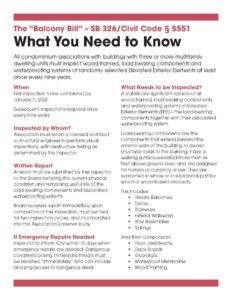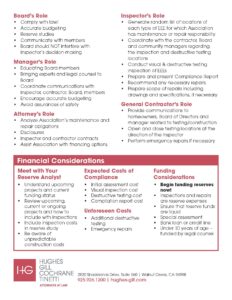Are You Behind on the “Balcony Bill” Requirements?
The “Balcony Bill” (otherwise known as Civil Code §5551) has been a hot topic since it was codified in 2019. Some are tired of hearing about it. Others believe there is no rush – there is still plenty of time! While the initial inspections do not have to be completed until January 1, 2025, if your associations haven’t started addressing its requirements, they are WAY behind.
Balcony Bill 101
What Needs to be Inspected?
All condominium associations with buildings with three or more multifamily dwelling units must inspect wood-framed, load-bearing components and waterproofing systems of randomly selected Elevated Exterior Elements – the load-bearing components together with their associated waterproofing system. Examples include private balconies, decks, stairways, exterior walkways, stair assemblies, railings, floor joists, beams, deck boards, guardrails, waterproof membrane, and wood framing.
When?
First inspection must be completed by January 1, 2025.
Inspected by Whom?
Association must retain a licensed architect or structural engineer to perform visual inspections, with destructive testing as determined by the Inspector.
Written Report
A report must be submitted by the inspector to the board detailing the current physical condition and remaining useful life of the load-bearing components and associated waterproofing systems.
If Emergency Repairs Needed
Inspector to inform City within 15 days when emergency repairs are needed. Dangerous conditions posing immediate threats must be repaired “immediately.”
Manager’s Role
• Educate board members
• Bring experts and legal counsel to board
• Coordinate communications with inspector, contractor, board, members
• Encourage accurate budgeting
• Avoid assurances of safety
Attorney’s Role
• Analyze association’s maintenance and repair obligations
• Disclosures
• Inspector and contractor contracts
• Assist association with financing options
What should you be doing now?
Meet with the reserve analyst
• Understand upcoming projects and current funding status
• Review upcoming, current, or ongoing projects and how to include with inspections
• Include inspection costs in reserve study
• Be aware of unpredictable construction costs
Begin funding reserves now!
• Inspections and repairs are reserve expenses
• Ensure that reserve funds are liquid
• Consider a bank loan or credit line, if necessary
Contact inspectors
• There is a high demand and limited supply of those who qualify – get on their schedule now
Contact general contractors as needed for inspection and testing
• As the inspection deadline approaches, contractors will be in higher demand
Want our complete “What You Need to Know” summary? Contact us at info@hughes-gill.com and we’ll send a copy your way!




